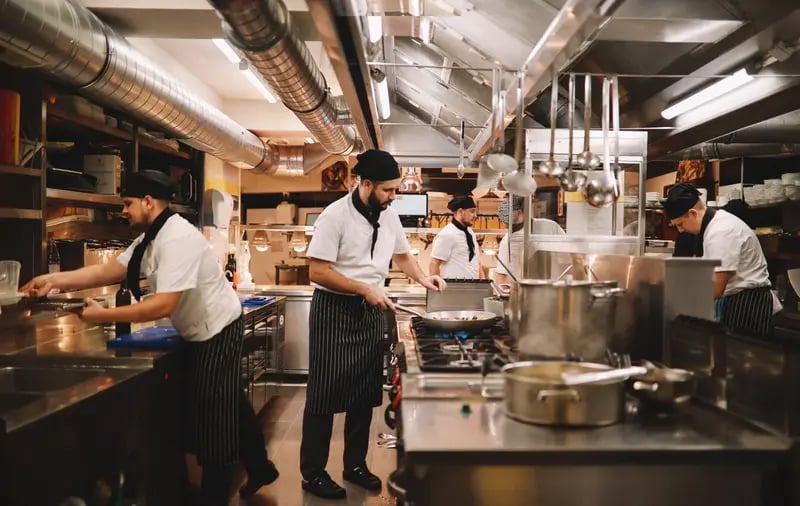Are you seeking a leadership role in the hospitality industry that combines a passion for food, providing excellent customer service, and inspiring the best in your team members?
If so, managing a restaurant could be something you'd be interested in doing.
If you're thinking about a career in restaurant management, there's no better time than now. The job market for restaurant managers is growing fast. In fact, experts predict an 11% increase in open positions by 2028.
Why the sudden boom? The way we eat is changing. More and more people are enjoying restaurant food outside of restaurants. Think fine dining establishments, delivery-only kitchens, and even special apps that bring food right to your door.
This means there are more opportunities than ever for restaurant managers, both in traditional and brand-new types of restaurants.
In this article, we'll guide you through the process of becoming a restaurant manager:
- The various restaurant management roles, such as General Manager, Restaurant Manager, Kitchen Manager, and Bar Manager
- The responsibilities and job descriptions of the many managers you can find in restaurants
- The competencies required to work as a kitchen manager, bar manager, restaurant manager, or general manager
- Resources, programs, and courses to get you started in restaurant management
.webp?width=2240&height=1260&name=Eat%20(45).webp)
How to take over as a restaurant's general manager
There are general managers of restaurants in many different types of food-service businesses, such as pubs, hotels, corporate food services, school cafeterias, and other locations where food is prepared for consumption.
Many have experience working in one or more busy restaurants in both the front and back of the house.
Job description for a restaurant general manager
A restaurant's general manager, or GM, oversees all day-to-day operations, including hiring and managing workers, maintaining inventory, serving food and beverages, keeping track of metrics and key performance indicators, and more.
The general manager (GM) holds the highest position in a restaurant hierarchy, supervising the restaurant manager, kitchen manager, and bar manager. In fact, the GM frequently oversees these lower-level positions.
The general manager (GM) and restaurant manager differ primarily in that the GM is responsible for higher-level business functions such as payroll record monitoring, annual budget oversight, and human resource management. The manager of a restaurant collaborates more closely with personnel managers.
The three primary responsibilities of a restaurant general manager are personnel management, customer service, and operational management.
Ordering and monitoring inventory, general supplies, cooking equipment, and general maintenance for both the front and rear of the house are all part of operations management. Keeping up ties with distributors and vendors will help guarantee that deliveries are always of a high caliber.
It can also entail making sure the premises are kept up and cleaned.
Though this will vary from restaurant to restaurant, general managers are usually quite involved in the hiring process and less so in the training and onboarding process when it comes to staff management.
Further reading
A general manager oversees the managers, unlike a restaurant manager who answers staff inquiries in the middle of a shift. Setting up a new employee for their first shift at a restaurant will be the responsibility of the general manager.
Establishing a successful restaurant requires three essential factors:
1. Customer service and relationship management.
2. Creating and maintaining the atmosphere.
3. An unforgettable dining experience for visitors.
Being aware of the reasons your guests keep coming back to dine with you is important to your success as a general manager.
As a general manager, every choice you make is intended to provide a positive and reliable customer experience.
What are a general manager's other key responsibilities?
A successful general manager of a restaurant should have strong problem-solving skills and be in charge of both the front and back of the establishment.
Making sure that customers are satisfied with their meals, monitoring sales figures, helping front-of-house workers with problems or inquiries, and keeping them informed about menu changes or stock availability are just a few of the responsibilities associated with leading the front of the house.
Managing the back of the house can involve scheduling, ordering, and managing supplies and inventories, employing and educating cooks and wait staff, and making sure that health and safety laws are followed.
The salary of a general manager at a restaurant
Restaurant general managers can anticipate an average compensation of $49,093, or $14.33 per hour, according to Payscale.com. With tips, incentives, and/or overtime pay included, an entry-level restaurant general manager with less than a year of experience might anticipate making about $39,772.
Responsibilities of a restaurant general manager
A general manager of a restaurant can have different daily responsibilities every day.
Here are a few tasks that a general manager of a restaurant would often have to perform:
- To turn on the lights and equipment, arrive early.
- Sign salary contracts.
- Purchase food and take stock of supplies.
- Items removed from customer bills.
- Upon completion of the shift, cash out.
- Putting marketing and advertising efforts into action.
- Recognize the needs of customers at the restaurant.
- Employees should be given instructions on operational procedures.
- Make judgments on hiring and firing.
- Make sure staff members handle food in the kitchen and dining areas in a hygienic manner.
.webp?width=2240&height=1260&name=Eat%20(46).webp)
Skills of a restaurant general manager
The following eight abilities are essential if you want to work as a general manager of a restaurant:
- A love of cooking and entertaining
- Strong leadership qualities demonstrated
- Excellent communication and problem-solving abilities
- Meticulous attention to detail
- Capacity to perform effectively under pressure
- Ability to mediate conflicts between employees and visitors
- And the capacity for self-motivation
What is the function of a restaurant manager?
The general manager of the restaurant is in charge of the restaurant manager. As the public face of the restaurant, managers of restaurants typically step in to make sure that patrons are receiving excellent service and a smile.
A competent manager of a restaurant is also in charge of staff management. This could include tasks like planning weekly plans and keeping an eye on employees' performance while they're working. To make sure that guests have a positive eating experience overall, they might also greet them.
A restaurant manager's main duty is to make sure that nothing gets in the way of food service.
Generally speaking, restaurant managers are in charge of hiring and orienting new hires, scheduling pre-shift meetings, and maintaining a positive work environment both before and during rush hour.
Further reading
Restaurant manager salaries
Are you curious about the salary of restaurant managers? The average pay for a restaurant manager is $58,231, according to Payscale.com.
Restaurant manager responsibilities
Is running a restaurant something you'd be interested in doing? If you are currently employed in the restaurant business and want to advance to management, you can search for chances to do some of these responsibilities there.
Hiring, educating, and managing employees
- Make sure the register is ready to accurately charge clients.
- Make an inventory.
- Oversee employee remuneration.
- Develop meals for special occasions or daily specials.
- Make sure employees follow the health and safety regulations in the kitchen.
- Marketing and promoting restaurants through social media and other channels.
Further reading
-2.webp?width=800&height=533&name=restaurant%20staff%20(1)-2.webp)
Skills of a restaurant manager
Now that you have a fundamental understanding of what it takes to run a restaurant, let's speak about your abilities.
What abilities must you acquire to succeed as a restaurant manager?
- Outstanding abilities in providing customer service
- Adaptable and capable of multitasking
- Talk to the staff, diners, and vendors.
- Be extremely detail-oriented.
- Foster a sense of teamwork; enjoy working in a hectic setting; and have goals.
Courses for restaurant managers
Most restaurant managers pick up important skills and strategies while working in the industry. All the same, for individuals who want to sharpen their skills outside of work, there are many options.
Certified Restaurant Managers can pursue a career trajectory through the National Restaurant Association's ServSuccess program.
Experts in the restaurant business created the course, which emphasizes the key managerial abilities that a restaurant manager must possess to succeed.
These abilities include managing finances, making purchases and keeping expenses under control, finding, selecting, and training excellent people, keeping an eye on worker performance, overseeing visitor and employee safety, and marketing.
Typsy offers bite-sized online hospitality training if you're seeking a career change or if you presently hold an entry-level job in the restaurant business.
Additionally, make sure to check out Eat App's Resource Centre, which offers a wealth of information on topics like staff training, responding to online restaurant reviews, and much more.
Further reading
Look into local schools, universities, or culinary programs that offer courses in hospitality management if you're seeking a more structured course or training program.
How to run a kitchen department
An excellent kitchen manager is someone who can lead the crew in the kitchen and ideally has experience in the culinary arts.
The majority of the duties for the back of the home fall to this manager.
Job description for a kitchen manager
What then does a manager of a kitchen do? As the name suggests, a kitchen manager is in charge of the kitchen of a restaurant. They report issues that the prep, dish pit, and line cooks have to deal with to the general manager in real-time.
They serve as the spokesperson for the kitchen, informing other managers and employees of significant menu changes. They are also important in menu planning, kitchen equipment management, and inventory purchase decisions.
Further reading
Maintaining the kitchen's workflow as well as overseeing the back-of-house crew, food preparation, and storage are examples of responsibilities.

Pay for a kitchen manager
The average hourly wage for a kitchen manager is $15.90, per Payscale.com. Salary variations can be influenced by a worker's location, experience, and availability of bonuses and tips.
Responsibilities of a kitchen manager
A career as a kitchen manager might be right for you if you enjoy working in the high-stress environment that is the kitchen. The daily tasks that kitchen supervisors perform are enumerated here.
- Stock up on ingredients that are highly sought after.
- Position orders and make sure everything is in its right position in the kitchen.
- Keep an eye on the kitchen staff to make sure the food is consistently cooked correctly.
- Modify the menu as necessary.
- Plan the kitchen's personnel schedule; monitor the kitchen's hygiene; and keep track of weekly and monthly expenses.
Skills of a kitchen manager
Although the kitchen can be a creative space, you must also make sure that your employees are trained and safe.
These are some of the abilities a great kitchen manager must possess:
- Creation of menus.
- Make consistently tasty cuisine.
- Make sure the kitchen employees are safe.
- Educate staff members on how to handle kitchen appliances properly.
- Keep an eye on labor and food expenses.
- Make delicious, eye-catching foods that your customers will love.
- Resolve issues.
- Savor the mayhem in the kitchen.
- Set a good example for leadership.
Resume for kitchen manager
What should be on the CV of a prospective kitchen manager hired by a restaurant operator, general manager, or owner?
- Strong background in back-of-house operations.
- A track record of leadership.
- A love of food is demonstrated by their experience working in the kitchen, their education, or their certifications.
- References from prior kitchen and back-of-house positions, as well as leadership experiences from other restaurant settings.
The art of bar management
It's important to understand that working as a bar manager entails spending a lot of time on your feet and engaging with customers.
In addition, the bar manager is in charge of the entire bar program, which includes ordering and monitoring inventory, supervising the bar personnel, and creating the drink menu.
Further reading
-2-1.webp?width=782&height=439&name=Restaurant%20bartender%20(1)-2-1.webp)
Job description for a bar manager
Bars are lively yet hectic places that require strong leadership to make sure that both patrons and employees are acting appropriately.
Along with managing hiring, operations, and logistics, managers are responsible for upholding revenue targets and providing a constant level of customer service.
In addition to handling staff scheduling and client complaints, some of them are also in charge of managing liquor licenses and adhering to local alcohol laws.
Salary for bar managers
Payscale.com states that a bar manager makes, on average, $11.69 per hour.
Bar manager responsibilities
Bar managers are crucial in making sure that all customers enjoy themselves while being safe and secure.
You will have a decent chance of getting the bar manager job if you can show that, regardless of the industry, you have performed any of these responsibilities in previous roles.
- Continue to hold your liquor license.
- Sign agreements with suppliers and distributors of alcoholic beverages.
- Keeping track of inventory and placing supply orders.
- Control spending.
- Keep the environment enjoyable and secure for both guests and bartenders.
Skills of a bar manager
Every bar has a distinct clientele and personality. Consequently, your skill set for a given profession may differ depending on the organization. These are some common abilities you can likely encounter at work.
- Establish a collaborative environment.
- Make certain that orders are being delivered to guests on schedule.
- Good communication with employees and clients.
- Possess a strong numeracy foundation and feel at ease handling money.
- Take on problem-solving roles.
It is worthwhile to look into the managerial chances in the restaurant business if you are a master multi-tasker, have a sense of hospitality, a love of food and drink, and can perform well under pressure.
Choose the section of the restaurant that most interests you to start. Are you a chef who's eager to take on new challenges and give team management a go? Are you prepared to take over as general manager and are you well-versed in the workings of almost any restaurant?
It's time to create a five-year professional plan. Which courses, if any, are required of you? What experience can you get today that will help you land the job you want in the restaurant business? Spend some time determining the most effective use for your knowledge and expertise, then proceed accordingly.
FAQ
How can you be a good restaurant manager?
A restaurant manager needs to inspire team members to collaborate by setting a good example.
Maintaining a high level of customer satisfaction should be a manager's everyday priority. It's not always necessary to attend school to learn how to handle complaints and professionally interact with consumers.
What are the skills you need to become a restaurant manager?
Strong abilities in providing customer service. Business savvy. Interpersonal and cooperative abilities.
What is the weakness of a restaurant manager?
A manager will find it challenging to fulfill the responsibilities of her role if she cannot communicate instructions, talk about projects, handle client problems, or settle employee conflicts.
Ineffective communication can result in miscommunication, missing deadlines, and conflict at work.
Is it hard to be a restaurant manager?
Running a restaurant is a challenging endeavor. Long hours, a fast-paced environment, and regular interaction—often in confined spaces—are conducive to particular personality types and traits.
















-1.png?width=1812&height=1072&name=TripAdvisor%20%26%20More%20Bookings%20(1)-1.png)
-2.png?width=1812&height=1072&name=Google%20Bookings%20(1)-2.png)
%20(1).webp?width=200&name=Eat%20(53)%20(1).webp)
%20(1).webp?width=200&name=Eat%20(15)%20(1).webp)
-1.png?width=200&name=TripAdvisor%20%26%20More%20Bookings%20(1)-1.png)
-2.png?width=200&name=Google%20Bookings%20(1)-2.png)
-1.png?width=200&name=Instagram%20Bookings%20(1)-1.png)
-1-png.webp?width=200&name=Facebook%20Integration%20Rectangle%20(1)-1-png.webp)







.webp?width=200&name=download%20(1).webp)
%20(1)-2.webp?width=200&name=Eat%20(34)%20(1)-2.webp)
%20(1)-2.webp?width=200&name=Eat%20(18)%20(1)-2.webp)




.webp?width=670&height=440&name=Eat%20(46).webp)






.webp?width=144&height=72&name=Eat%20App%20Logo%20(3).webp)